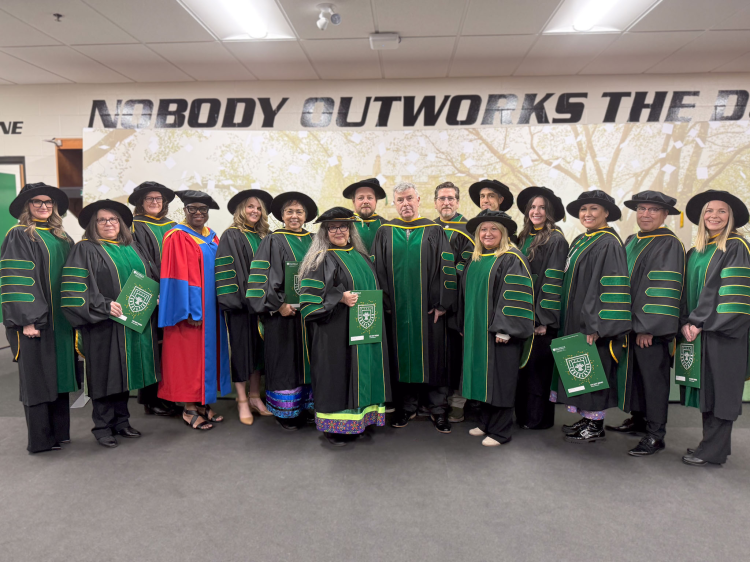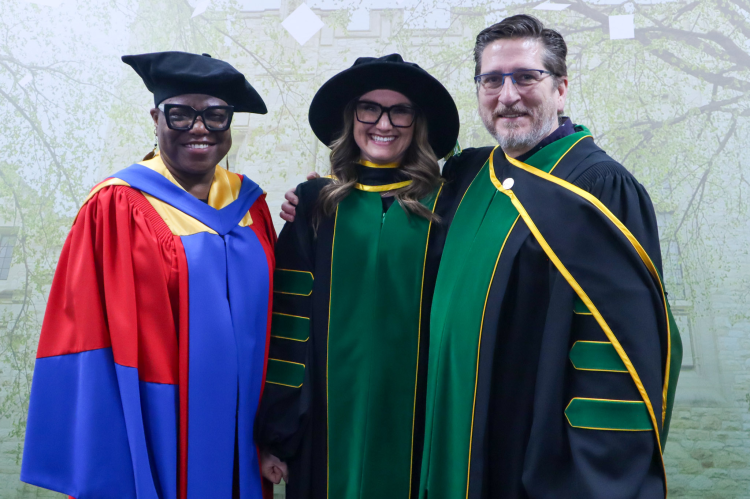
The first Doctor of Education (EdD) graduating class at USask Fall Convocation (Photo: Connor Jay)
The Doctor of Education (EdD) in Educational Leadership welcomed its inaugural graduating class at University of Saskatchewan (USask) Fall Convocation on Nov. 13.
Launched in 2019 by the Department of Educational Administration in the College of Education, the program develops leaders in sectors such as K-12 education, First Nations leadership, higher education, and social organizations.
The three-year EdD program provides advanced learning to enhance leadership capabilities for executive leaders, provide tools for the development of research, inform practice and develop the capacity of leaders in educational research in their own contexts. Conversations and discussions with sector partners, high-profile senior educational leaders, and master's students wanting to pursue supplemental advanced learning informed the creation of the EdD.
"The students in the program are already or aspiring to be in senior leadership positions and want to engage in a terminal degree in educational leadership without them needing to take a leave from their jobs," said department head Dr. Paul Newton (BMus'92, MEd'01, PhD'03). "What we're doing in the program aligns with what's going on in their workplace as well."
Former USask College of Education, Indian Teacher Education Program (ITEP), and Saskatchewan Urban Native Teacher Education Program (SUNTEP) graduates, as well as students from British Columbia, Alberta and Manitoba are part of the first EdD cohort, which welcomed students in the summer of 2021.Diana Jemieff Hayes (BEd'07, BMus'07, MEd'13) is one of those EdD students. She knows the honour it is to be in this first graduating class.
"The EdD was a significant experience," said Jemieff Hayes. "My classmates and I had a real sense of responsibility and pride. We knew that we were the first cohort and that we were paving the path for future students."
Jemieff Hayes pursued an EdD because of her interest in organizational wellness and passion for making changes at the systemic level. Once she transitioned into her administrative role as principal within the Prairie Spirit School Division (PSSD), she recognized the importance of building her leadership skills to strengthen her advocacy for students.
Her research, Restorative Justice and the Equity Matrix: Bridging the Discipline Gap, explored restorative approaches to school discipline. She introduced an equity matrix for teachers and administrators that helps anticipate and respond to student behaviours and better support marginalized students.
"Instead of seeing students through a deficit lens, this approach encouraged educators to focus on the oppressive factors that hold students back from feeling included and achieving their best," said Jemieff Hayes. "Using this tool really helped school leaders to create a sense of psychological safety for students, and it prevents students from falling through the cracks.""I formed lifelong friendships within this cohort - people who feel like family to me now."
Diana Jemieff Hayes
Besides the doctorate degree, she will graduate from the program with a strengthened and practical skillset as a leader. Jemieff Hayes has become a better advocate for policies and practices that benefit her school division and the wider educational community.
"The EdD has given me the skills to conduct solid research, which has allowed me to share valuable insights with colleagues and stakeholders. This year, I'm not only applying those skills but also leading professional development initiatives and guiding action research cycles within my school."
The benefit of the EdD is the immediate translation from the research to the leaders' respective fields. Course knowledge is applied quickly and directly. Newton notes the original research by the students has engaged the department's faculty and staff in the learning journey of the cohort.
"When I'm sitting in these meetings, it is a great privilege to be working with great leaders and great thinkers to help them get to the point where they're getting their research out there," shared Newton.
As one of the few EdD programs in Canada to have an in-person summer residency experience, this cohort became a tight-knit community quickly. Faculty in the department noticed early on how comfortable the class became with each other.
"Within the classes, small groups are established virtually early in the program where they have a comfortable, familiar space to interact with other students that they get to know all the way through," said Newton. "On the first day of the residency, they were cordial and polite but didn't really know each other. By day two, it's quite amazing to see how that group dynamic developed so quickly and how they feel like they are a family right off the bat."
Jemieff Hayes gave credit to the close bond she had with her colleagues. She mentions that they enhanced her learning experience and encouraged her to think creatively.
"We built deep, meaningful relationships and became this supportive network for each other. Collaborating with my classmates was an invaluable experience, and I gained so much from their perspectives and insights. I formed lifelong friendships within this cohort - people who feel like family to me now."
She hopes that future EdD cohorts will also support each other to get the most out of the experience. She recommends leaning on and consistently communicating with colleagues and faculty.
"It can feel isolating at times, especially when you're deep into your individual research. However, I believe your classmates are one of your most valuable resources. They provide a sounding board for ideas and offer support during the tougher moments which makes it easier to navigate the more challenging aspects of the journey."

Diana Jemieff Hayes (middle) with her supervisor, Dr. Janet Okoko (left), and EADM department head Dr. Paul Newton (right). (Photo: Connor Jay)
Newton and the EADM department were pleased with how the first group went through and are looking for ways to improve and refine the program to generate greater impact. Conversations about using the new graduates' knowledge with current and future cohorts, sector-specific cohorts and exploring an international residency are on the table.
"How do we draw on some of the expertise that the new graduates now have to contribute back to our program?" asked Newton. "The current [third] cohort has a group of Indigenous directors of education in it. We're talking about significant impact in the provincial First Nations education system. We have USask employees, Saskatchewan Polytechnic employees, and employees and staff from other universities who are taking this [program]. It will have an impact on their own post-secondary institutions."
Jemieff Hayes will be thinking of her family as she crosses the stage at the convocation ceremony. Her parents and husband were integral in support of her on this journey and believed in her more than she believed in herself at times. But she'll be most proud to have her two daughters there.
"My two young daughters are a constant source of inspiration for me," she said. "I strive to be a strong female role model for them."













